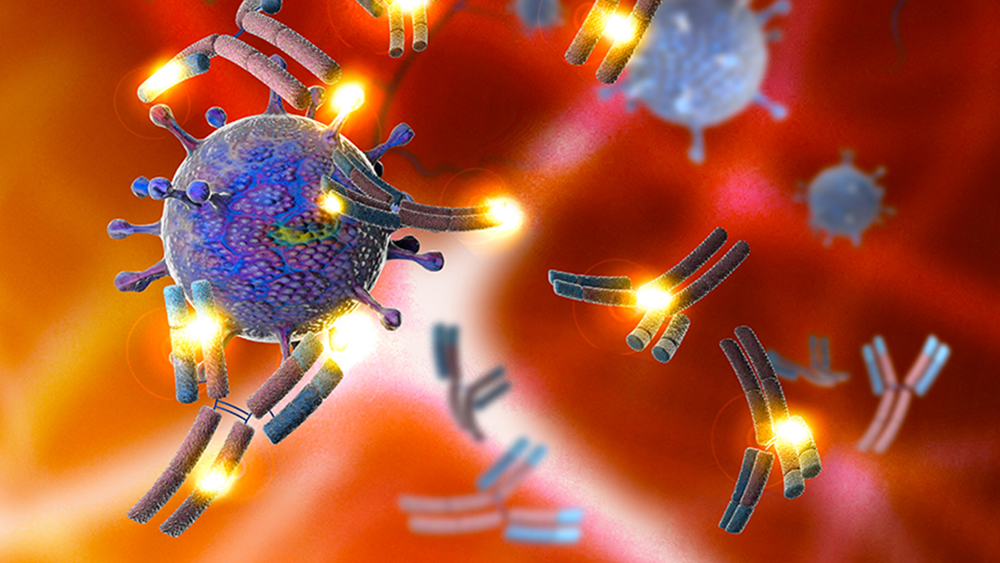
Antibodies (the Y-shaped molecules) defend the body by attaching to and inactivating specific proteins on the surface of the SARS-CoV-2 virus.

Antibodies (the Y-shaped molecules) defend the body by attaching to and inactivating specific proteins on the surface of the SARS-CoV-2 virus.
What you need to know
As SARS-CoV-2 — the virus that causes COVID-19 — continues to spread, there is a greater chance that viral variants can develop. “Variants of concern” like Delta (B.1.617.2) and Omicron (B.1.1.529) can be more infectious or cause more serious illness than the original virus. There is much more to learn about how long immunity against SARS-CoV-2 lasts and whether current treatments for COVID-19 will be effective against new viral variants.
Monoclonal antibody infusions have proven to be an effective treatment for mild to moderate COVID-19. A global study supported by the National Institute of Allergy and Infectious Diseases (NIAID) has identified several new monoclonal antibody candidates that may work together to treat COVID-19 caused by viral variants.
What did the researchers do?
Researchers from around the world established the Coronavirus Immunotherapy Consortium (CoVIC), a collaborative effort to determine which antibodies are most effective against SARS-CoV-2.
CoVIC researchers analyzed 269 monoclonal antibodies and mapped where they bind to the SARS-CoV-2 spike protein. The spike protein is an important protein on the surface of the virus that can mutate as the virus evolves. Researchers first grouped the antibodies into seven “communities” and then used an electron microscope to show that each community of antibodies recognizes a specific molecular segment of the spike protein.
A key part of finding new antibody treatments for COVID-19 is knowing how well they may be able to treat viral variants. CoVIC researchers analyzed how well the antibody communities were able to attack the virus with varying spike protein mutations. They found that three specific communities of antibodies were able to consistently neutralize SARS-CoV-2, regardless of which mutations were present, suggesting that antibodies in these communities are the most attractive candidates for future COVID-19 treatments.
Why is this research important?
Existing monoclonal antibody infusions are an effective treatment for COVID-19, and finding new treatments that work against current and future viral variants is a top priority.
The Omicron variant has emerged since this research was completed. That variant has approximately 30 mutations in the spike protein. It is not yet known which monoclonal antibodies may be able to neutralize this variant.
The results from this CoVIC study have given researchers a window into antibodies that may be effective treatments against a wide array of potential viral variants, including Omicron.
Where can I go to learn more?
Coronavirus Immunotherapy Consortium (CoVIC)
-
This global initiative accelerates the discovery, optimization, and delivery of lifesaving antibody-based therapeutics against SARS-CoV-2 and is funded in part by NIAID.
NIH COVID-19 Treatment Guidelines: Monoclonal Antibodies
-
NIH’s COVID-19 Treatment Guidelines provide clinicians with evidence-based recommendations on the management of COVID-19.
COVID Data Tracker: Variant Proportions
-
The Centers for Disease Control and Prevention (CDC) is monitoring new and emerging SARS-CoV-2 variants to understand the implications for COVID-19 diagnostics, treatments, and vaccines.
Understanding SARS-CoV-2 Antibody Binding
-
An article in NIH Research Matters covers recent findings from the CoVIC researchers.
Sources
Hastie, K. M., Li, H., Bedinger, D., Schendel, S. L., Dennison, S. M., Li, K., Rayaprolu, V., Yu, X., Mann, C., Zandonatti, M., Diaz Avalos, R., Zyla, D., Buck, T., Hui, S., Shaffer, K., Hariharan, C., Yin, J., Olmedillas, E., Enriquez, A., Parekh, D., … Saphire, E. O. (2021). Defining variant-resistant epitopes targeted by SARS-CoV-2 antibodies: A global consortium study. Science, 374(6566), 472–478. https://doi.org/10.1126/science.abh2315

News and Stories
Read stories about the efforts underway to prevent, detect, and treat COVID-19 and its effects on our health.
 An official website of the United States government
An official website of the United States government

